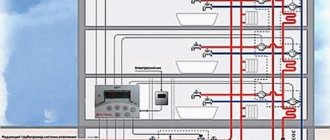Question in light of legislation
You won’t be able to think about anything at all—not a single room will be provided free of charge. So, at a minimum, you will have to pay for the apartment and keep the common property in order (Article 678 of the Civil Code of the Russian Federation).
Responsibilities of a residential tenant
The tenant is obliged to use the residential premises only for living, ensure the safety of the residential premises and maintain it in proper condition. The tenant does not have the right to carry out reconstruction and reconstruction of residential premises without the consent of the landlord. The tenant is obliged to pay rent for the premises on time. Unless otherwise specified in the contract, the tenant is obliged to make utility payments independently.
Do I have to pay for major repairs if the apartment is not privatized? According to the current law, whoever owns the home pays for it (Article 158; 169 of the Housing Code of the Russian Federation). Should tenants pay for major repairs?
If the apartment is not the property of a person, that is, he either rents it or lives under a social tenancy agreement, the payment for major repairs of a municipal apartment falls either on the municipality or on the landlord. If such receipts arrive at the address where a commercial tenant lives, they must be handed over to the owner of the premises.
Moreover, according to current standards, contributions must be paid for everything - both inhabited and non-residential premises of the building included in the overhaul program.
Who should change batteries in a privatized apartment
To understand whose responsibilities include repairing a balcony in privatized housing, you need to refer to the legislation of the Russian Federation, namely to the RF PP dated 08/13/2006 N 491. It follows from it that ownership of the various components of the balcony is distributed as follows:
In recent years, more and more citizens of our country are privatizing their housing, transferring it from municipal to private ownership. Undoubtedly, privatized housing has a number of advantages, the main one of which is the ability to use it in almost any way, at the discretion of the owner.
If the apartment is municipal, then who pays for major repairs?
So who pays for major repairs in a municipal apartment? The one who owns it is the municipality . Does the tenant have to pay for major repairs? This does not concern him (Article 154 of the LC). The fee required from residents of state “squares” includes payment for:
- for hiring;
- maintenance and repair of the house (we are talking about current repairs);
- Housing and communal services (gas, sewerage, hot and cold water, garbage removal. Important: contrary to the established opinion of some not very literate citizens, the category of housing and communal services does not include major repairs! This is a separate item that can only be applied to the owners of the premises. True, the problem is that in practice the difference between current and major repairs may turn out to be purely arbitrary).
Does the tenant have to pay for major repairs?
Should a non-homeowner pay for major repairs? No, you shouldn't .
A person living in an apartment for commercial rent is obliged to pay the amount specified in the contract and housing and communal services. If such receipts arrive, they need to be sent to the owner of the apartment. If you occupy space under a social tenancy agreement, you can simply ignore receipts for major repairs. But it would be better if you contact the Management Company with a request to resolve the misunderstanding.
Repair in a non-privatized apartment
Advice from lawyers:
1. Should residents of a non-privatized apartment pay for major repairs?
1.1. No, they shouldn’t, since they are not homeowners. The obligation to pay for major repairs lies with the owners, according to the Housing Code of the Russian Federation.
Did the answer help you?YesNo
Consultation on your issue
8
Calls from landlines and mobiles are free throughout Russia
2. Do people living in a non-privatized apartment need to pay for maintenance and repairs?
2.1. I can help you resolve your situation, contact me via PM, we’ll discuss your situation in detail and I can tell you in detail how to proceed.
Did the answer help you?YesNo
3. If the apartment is not privatized, do I need to pay a cap? repair.
3.1. If you are a council tenant, you do not need to pay for major repairs. Only apartment owners pay.
Did the answer help you?YesNo
3.2. Good afternoon. For cap. repairs are paid by the owners of residential premises, including those who received the right through privatization. Employers like you, for the cap. they don't pay for repairs.
Did the answer help you?YesNo
3.3. The owner of premises in an apartment building is obliged to bear the costs of maintaining the premises belonging to him, as well as to participate in the costs of maintaining common property in an apartment building in proportion to his share in the right of common ownership of this property by paying fees for the maintenance and repair of residential premises, contributions for major repairs (Part 1 of Article 158 of the Housing Code of the Russian Federation). The obligation to pay the costs of major repairs of an apartment building applies to all owners of premises in this building from the moment the ownership of the premises in this building arises (Part 3 of Article 158 of the Housing Code of the Russian Federation). Thus, persons who are not the owners of residential premises in an apartment building are not responsible for paying contributions for major repairs.
Did the answer help you?YesNo
3.4. Hello. No, it’s not necessary, the responsibility to pay for major repairs lies only with the apartment owners. Good luck.
Did the answer help you?YesNo
4. There are 3 of us registered in a non-privatized apartment. In fact, my mother and I live together. I had an argument with her, she went to the housing and communal services department and wrote a statement that our pipes were in disrepair. The plumbers turned off the cold and hot water. When I came to them, one of the workers said that change the pipes and we will connect it. The boss said pay 2200 and we will connect the water to the old pipes. Do I have to pay for the repair of old pipes and pay for connection?
4.1. Hello. Employees servicing your home are required to check the condition of the pipes. If the pipes are in good condition, then you are not required to pay anything.
Did the answer help you?YesNo
5. Do I have to pay for major repairs? If I live in a non-privatized apartment and I don’t have a social lease agreement, bills just come to me after the death of a relative.
5.1. Housing and communal services are paid by the tenant of the premises under a social tenancy agreement. The fact that the right to use residential premises is not properly formalized does not matter, since the institution of “warrant” that existed before March 1, 2005 replaced the institution of “social tenancy” (Article 5 of Federal Law No. 189-FZ of December 29, 2004). This means that persons currently living in an apartment building are required to pay for housing and utilities, regardless of the basis of residence. At the same time, the payment for the maintenance of residential premises does not include contributions for major repairs for persons who are not the owners of the residential premises. Major repairs of common property are carried out at the expense of the owner of the housing stock (clause 1 of article 154 of the Housing Code of the Russian Federation). Therefore, there is no obligation to pay for major repairs.
Did the answer help you?YesNo
6. I live in a non-privatized apartment. My upstairs neighbors flooded me. They came from the management company and drew up a report. The neighbors' apartment is insured. As a result, the money came from the insurance company or somewhere else (I didn’t go into details) to the administration’s account. But they won't give them to me. They say do the repairs and bring us the receipts and then we’ll give you the money. But we have no money. My salary in the village is 12,130 rubles. What should mana do? Thank you!
6.1. Evgeniy Viktorovich, my advice: you need to contact an appraisal company, whose employees must conduct an independent examination of the flooded living space. Based on this examination, an estimate of the funds required to carry out restoration work on the premises and bring it back to its original appearance will be drawn up. Once the estimate is ready, you can contact the Administration of your city or district.
Did the answer help you?YesNo
7. I own a privatized room in a communal two-room apartment, I want to buy the second non-privatized one, but the owners are on social security. They don’t live there for hire and don’t get in touch sometimes they rent it out to unknown people for repairs of public places they don’t allocate money, what should I do?
7.1. Hello Sergey! You cannot buy a non-privatized room from them. As for repairs to common areas, the costs are borne by the owners. You, since your room is owned by the owner of the room next door. The owner of the next room is either the administration or the Department, those who provided the room for rent to your neighbor.
Did the answer help you?YesNo
7.2. Dear Sergey, Krasnoyarsk! When resolving this issue, you need to KNOW that: - You CANNOT buy a non-privatized apartment from its Tenant; - You can only buy a non-privatized apartment at auctions held by the Administration of the municipality. Good luck to you Vladimir Nikolaevich Ufa 01/17/2020
Did the answer help you?YesNo
8. A friend has a municipal, non-privatized apartment; the eldest woman and her assistant did some renovations at the entrance (they painted the walls and replaced the mailboxes), they are the owners. The elder of the house demands that he pay for this repair. Is he obligated to pay, not being the owner, for these repairs?
8.1. Demanding payment is illegal. Your friend, the tenant of municipal housing, his responsibilities include only the maintenance, repair and care of the housing itself, but not the entrance, roof, etc.
Did the answer help you?YesNo
9. How legal is it to include in separate columns in a receipt for payment for a non-privatized apartment: 1. Housing maintenance, 2. Current repairs (roofing), 3. Additional. service (PS fee), 4. Additional. service (cleaning). In addition, the chairman of the house council does not provide minutes of the meeting. In particular, the current repairs included (the fee was distributed to all apartments) the insulation of the balconies of several apartments, and the repair of the roofs of several apartments.
9.1. This is illegal, you did not give him such a right to distribute expenses.
Did the answer help you?YesNo
10. Non-privatized apartment, there was a large overpayment to the management company (maintenance and repair of housing), more than 50 thousand. The management company refused to return the overpayment and did not respond to the application. I was told that the overpayment for maintenance and repairs cannot be returned even through the court, is this true?
10.1. No that's not true. It can be returned in court.
Did the answer help you?YesNo
10.2. You need to go to court with a statement of claim to recover unjust enrichment from the Criminal Code.
Did the answer help you?YesNo
11. In a non-privatized apartment of 62 m², my father, mother, uncle, me and my minor son (4 years old) are registered. I live there with my husband and son. My uncle raises the issue of dividing the housing, but I don’t want to make an exchange (we are making repairs and arranging everything). What options are there to solve this issue? How to correctly calculate how many squares are in this apartment?
11.1. Hello! The grandfather can demand anything; he cannot do anything without the consent of everyone registered. There are no meters of his in the apartment. all tenants have the right to use the entire apartment.
Did the answer help you?YesNo
12. In a non-privatized apartment, the heating risers are swollen. Who should pay for repairs and materials?
12.1. WHAT you have swollen belongs to common property. The management company must pay and do it.
Did the answer help you?YesNo
13. My husband died; he lived in a non-privatized apartment of his mother who died 10 years ago. His brother also registered there. Can I register there through the court and privatize the apartment? At the moment, it is not intended for housing, as my mother and her husband started doing major renovations, but did not have time to finish it. But my brother never lived there.
13.1. You have no reason to move into the said apartment. My brother wants to privatize the apartment.
Did the answer help you?YesNo
Consultation on your issue
8
Calls from landlines and mobiles are free throughout Russia
14. I receive receipts for the maintenance and repair of common property, a communal resource of electricity for the purpose of maintaining common property, a communal resource of cold water for the purpose of maintaining the common property of an apartment building. The apartment is not privatized. Should I pay?
14.1. Hello, yes, of course, all current expenses for maintaining housing and a proportional part of the common property are borne by the tenant.
Did the answer help you?YesNo
15. Can the management company repair a rotten wooden floor in a non-privatized apartment?
15.1. The management company is obliged to carry out repair work for you to replace the floor covering.
Did the answer help you?YesNo
16. Question. In a wooden 4-apartment building, three apartments have been privatized. One non-privatized apartment has not been lived in for more than 15 years. It needs a lot of repairs, there are no windows, floors, heating, water. Can I purchase this apartment for expansion, since I have two sons, two granddaughters and a daughter-in-law registered and living with me? That is 6 people at 38 meters. Can I collect the necessary documents for the extension. Thank you.
16.1. Submit your application and documents in the prescribed manner. You must either be identified as needing a vein upgrade. conditions, or apply for ransom.
Did the answer help you?YesNo
17. The situation is like this. There is a non-privatized apartment that has been undergoing major repairs for a long time. We paid for it. Then, three years ago, rent payments began to arrive. We didn’t pay for it; over three years, the amount accumulated was about 23,000 rubles. Question: why pay for rent if the receipt includes major repairs and maintenance of the property?
17.1. You have to pay for rent, but you use someone else’s property. But there is no need for major repairs; the homeowner must pay for it. And in this case, no one can oblige you to make such a payment. It is the obligations that must be fulfilled, not what you want to do.
Did the answer help you?YesNo
18. I'm 20 years old. Mom (single) died in August. I'm a second-year full-time student. Received in October 2020. (Already have completed secondary education) I have been living in a social hotel since 2020. Because Mom led an unhealthy lifestyle. Do I have the right to receive payments (pension) and receive orphan status? My mother inherited a non-privatized apartment (2-room). With debts totaling 200 thousand rubles. There are no conditions for living. (Lights out, no repairs)
18.1. The pension authorities will ask you to confirm that you were her dependent, that she supported you.
Did the answer help you?YesNo
18.2. Good afternoon. A survivor's pension is issued to adult children under 23 years of age, while the student must receive higher or secondary specialized education in full-time education and must not work anywhere. Always happy to help.
Did the answer help you?YesNo
19. I live in a two-story wooden house in a privatized apartment, we have two cesspools in our house, one of them, on the other side of the house, has collapsed, it needs repairs, on the other half on the ground floor there is a non-privatized apartment, they came from the administration and from the management company they counted for the repair 80,000 thousand rubles, for the repair of the pit who should pay for the repair? Administration or residents, what is the way out?
19.1. Good afternoon, all owners must pay for repairs in proportion to the area of their apartments, including part of the costs must be covered by the administration, since one apartment is still in municipal ownership.
Did the answer help you?YesNo
20. The battery is leaking in a non-privatized apartment. The plumber from the building management tried to repair it for two days in a row. I couldn't solve the problem. Today a commission from the house management came and decided that the battery was unsuitable for repair. They offered to buy the battery at their own expense and pay for installation. Should these costs be borne by the building management?
20.1. This is a municipal apartment, therefore the owner (municipality) must bear the burden of maintaining his property (this is in accordance with the Civil Code of the Russian Federation). If they don’t want to, then complain to the Housing Inspectorate.
Did the answer help you?YesNo
20.2. This is a municipal apartment, therefore the owner (municipality) must bear the burden of maintaining his property (this is in accordance with the Civil Code of the Russian Federation). If they don’t want to, then complain to the Housing Inspectorate.
Did the answer help you?YesNo
My apartment is not privatized. Today I called from the department. Com. electrician to repair a switch in an apartment.
In 1993, our paternal grandmother died. She lived in a non-privatized apartment and was the only one registered there.
Communal apartment is not privatized. The apartment belongs to the municipality.
We have a non-privatized apartment due to a malfunction during the inspection, the gas was cut off, the company carried out repairs, who must pay for the connection.
In a non-privatized state apartment, replacement of Mayevsky taps on central heating batteries is required (apartment on the fifth floor of a five-story building).
At whose expense is the repair/replacement of heating radiators in a non-privatized apartment carried out?
Please tell me, according to current legislation, in a non-privatized apartment, the city administration must install glass packages?
The apartment is rented and not privatized. Do we have to pay for the maintenance and repairs of the apartment?
The question is: I live in a non-privatized apartment, do I have to pay for major repairs?
I, my husband and child live in a non-privatized apartment in which a minor relative is registered,
Who should pay for plumbing repairs (for example, replacing the pipe from the entrance to the bathroom)
How is the fee calculated?
The amount indicated in receipts sent to addresses may vary. The amount depends on many nuances , the main ones being the age of the house and the presence or absence of an elevator . It is clear that the renovation of Stalin-era buildings and the construction of elevator structures in them will cost much more than the nine-story buildings built at the end of the previous century.
The work itself will be carried out in a regular order. Where you place in line depends on the following factors:
- when the house was put into operation;
- how much money has already been collected;
- date of last overhaul.
The transferred contribution should not be less than the denomination established by the state (in the Moscow region it is eight rubles and thirty kopecks), but it can be increased by decision of the meeting of apartment owners. The calculation is carried out in rubles according to the principle: the cost per square meter multiplied by the total area of the home.
Money can be transferred in two ways : to a dedicated special account for a specific home, or to the account of a regional operator.
If the owners choose the first option, then on the one hand this is preferable (because the movement of money is completely in their sight), on the other hand, the owners are responsible for literally everything.
And this includes the choice of the bank and the account owner, and the determination of the size and nature of the work, their acceptance, and the preparation of estimates. That is, quite a lot. And you will have to report quarterly. Residents need to decide how contributions will be transferred within two months after the adoption of the regional program. If they do not reach a consensus during this time, the second option will be considered by default , that is, the regional operator.
Should residents of non-privatized apartments have to pay for major repairs? In other words, if you have not privatized the premises, then you do not have to pay for major repairs. If you are renting, inform the landlord about the receipts, and if the tenant is on social rent, contact the management organization.
Didn't find the answer to your question? Find out how to solve exactly your problem - call right now:
Housing Payment Law
It won’t work to pay for anything at all; they don’t provide citizens with a single apartment for free. Therefore, you will have to pay for the maintenance and current repairs of common property, as stated in Article 678 of the Civil Code of the Russian Federation.
It says that tenants must use rented municipal housing only for living, while maintaining it in proper condition . They cannot organize various redevelopments without the consent of the landlord. They are also obliged to pay for the rental of residential premises within the specified time frame. Unless otherwise specified in the contract, they must pay the fee themselves.
At the same time, to the question whether the tenant is obliged to pay for major repairs if the apartment is owned, the answer is yes. According to Articles 158 and 169 of the Housing Code, who owns the premises, that is, the tenant, pays for the work. Then the question arises: in the case when the apartment is not privatized, who will pay for major repairs?
Tenants do not make contributions towards capital repairs of public premises, because this is the responsibility of the owners, represented by the municipality or the landlord.
Copyright holders pay for major repairs, and when receipts are received at the tenants’ address, they must be redirected to the apartment owner, at whose expense such work is paid.
At the same time, you need to pay for premises that are subject to repair - both residential and public, and uninhabited, they are included in the program.
Who should repair pipes in a municipal apartment?
In accordance with the Decree of the State Construction Committee of the Russian Federation dated 03/05/2004 N 15/1 “On approval and implementation of the Methodology for determining the cost of construction products on the territory of the Russian Federation”, Resolution of the State Construction Committee of the Russian Federation dated 09/27/2003 N 170 “On approval of the Rules and Standards for the Technical Operation of Housing fund" and Order of the State Committee for Architecture dated November 23, 1988 N 312 "On approval of departmental building standards of the State Committee for Architecture "Regulations on the organization and conduct of reconstruction, repair and maintenance of residential buildings, communal and socio-cultural facilities" for the current repair of residential premises, which you must carried out at your own expense, include: whitewashing, painting and pasting of walls, ceilings, painting of floors, doors, window sills, window sashes on the inside, radiators, as well as replacement of window and door fixtures, repair of internal engineering equipment (electrical wiring, cold and hot water supply , heat supply, gas supply).
That is, the costs of replacing pipes in the apartment must be borne by you. Hello! I live in municipal housing, at night a pipe under the bathtub with hot water burst, they called the management company, called a plumber, they said that if it was a central riser, then the repairs would be carried out at the expense of the management company, and if it was plastic pipes under the bathroom, then the repairs would be at the expense of the residents ! The pipes have not been changed since the day we moved into the apartment. Is the CC right?
Payment for major repairs
So, who pays for future major repairs if the apartment is municipal? This must be done by the owner of the non-privatized apartment, that is, the municipality. The tenant is not obliged to do this, since he is not the owner and, according to Article 154 of the Housing Code, does not bear any obligations for such work. The payment for housing and communal services includes only the following items:
- for rent of municipal premises;
- for maintenance and ongoing repair work inside the apartment;
- for gas, water, garbage removal and other utilities.
Therefore, paying for major repairs in no way falls on the shoulders of employers , although many are sure that it is necessary to pay. No, only owners of residential premises need to make contributions to the fund for the work being carried out. But in some cases, the differences between current and major repairs are quite illusory, and not only owners, but also tenants have to pay for such work.
What housing and communal services should and can repair in an apartment for free
Most residential property owners and tenants are faced with the problem of repairing utility networks in their apartment, but most often they have no idea what kind of services management companies (MCs) should provide for free. Housing and communal services are actively taking advantage of this situation, illegally charging additional fees for services, the cost of which is already included in the bills received every month by homeowners.
- Gas and electric stoves.
- Central heating radiators.
- Individual metering devices. These include gas, water, and electricity meters.
- Electrical cables, ceiling lamps, switches and sockets located inside apartments.
- Plumbing – taps, bathtubs, mixers, related fittings, toilets, water heaters, sinks.
- Intercoms.
We recommend reading: Redevelopment of an apartment, what can be done without permission
Responsibilities of the employer
The main responsibilities of the tenant are payment for received utilities on time and maintenance of the premises. However, he does not pay property taxes.
In addition, the tenant is obliged to use the rented premises only for its intended purpose, and he must keep it in good condition. It follows from this that he is obliged to carry out routine repairs on time, to prevent dilapidation and damage to the living space. Similar works include:
- painting the ceiling, doors and windows;
- wallpapering walls;
- painting batteries and pipes.
If the doors and windows become unusable, the tenant is obliged to replace them with new and serviceable ones. Also, if necessary, it is necessary to repair electrical, gas wiring and other communications. To do this, you need to call professional specialists. Redevelopment work on the premises without the consent of the landlord is prohibited. But work on common property falls on the owner, who must pay for it, that is, this is the responsibility of the public service.
If bills are received to pay for major repairs for a tenant, they must be sent to the owner of the premises. When such receipts are received by social rented tenants, there is no need to pay a fee, but it is worth contacting the Management Company, which will sort out such a mistake, because paying for major repairs is the responsibility of only the owners.
Calculation of contributions
Their sizes vary from place to place. The amount is directly dependent on the deterioration of the house and the presence of an elevator system. From this it is clear that in dilapidated Khrushchev and Stalin buildings, major repairs will be more expensive than in Brezhnev panel houses.
All work is carried out only within the established time frame, which depends on many factors:
- age of the building;
- money collected by the owners;
- date of the last capital work carried out.
The payment should not be less than that established by municipal authorities, but it may be more when it is decided by the homeowners. Such a fee is calculated simply - square meters are multiplied by the price per 1 square meter.
Funds are transferred in two ways:
- To the account of a separate residential building opened for this purpose.
- To the account of the regional operator.
In the first case, the movement of funds can be tracked, but this is also a great personal responsibility that the homeowners bear. That is, choosing a financial organization, appointing an account owner, calculating planned work, etc. In this case, it is necessary to report to regulatory authorities every three months.
But in any case, residents of a state apartment are not required to pay for major repairs in a municipal apartment if it is not privatized. If you receive receipts with the corresponding column, then you should go to the Management Company and resolve such a misunderstanding regarding payments. You can also simply ignore and not pay - this will not violate the current legislation.
The official will fork out
There is still a lot of old and problematic housing in the country. And it’s no secret that apartments in such “elderly” buildings are mainly inhabited by poor, old and sick citizens. Residents of a dilapidated building, as a rule, are no longer able to take out a mortgage and purchase something new. According to experts, it is in such houses that the majority of municipal housing is located, that is, those whose owners are local authorities. And citizens live in them under social tenancy agreements. Our “repair” court case concerns specifically old municipal housing.
How to replace input in an apartment
The ideal option is when the access panel is located on one wall through which entry into the apartment will be made; in such a situation, it is enough to drill a hole in it and insert a new cable there. In other options, first of all you need to decide how the old wiring is laid. It is possible that the wiring is laid in a groove under the plaster; in this case, you can carefully dismantle it and lay a new input in the same place, followed by restoration of the wall covering. This method is not always possible, for example, if the entrance has just recently been renovated, the neighbors will not be delighted with the destruction of the freshly painted finish that smells like fresh paint.
Most often, the cable is pulled through the ceiling ducts; in most cases it is not possible to perform the same operation at the stage of completed construction. The best option in all cases would be to lay the input cable in a box or corrugated pipe, as shown in the photo below:
For safety reasons, in order to avoid damaging the existing hidden wiring, it is better to lay the cable along the ceiling. If dismantling the old cable is not possible, its free ends must be insulated.
An example of replacing the input cable in an apartment is shown in the video:
Who pays for major repairs in 2020 if the apartment is municipal?
The law on transfers for major repairs came out recently and it’s hard to say that it pleased apartment owners. Some without joy, but obeyed, others began to carry out a obviously doomed war. But what about those who are not the owner of the apartment? Who should pay for major repairs if the apartment is municipal? The answers to these questions are of interest to many.
It is impossible not to think about this problem at all - municipal housing will not be provided on a free basis. So, at a minimum, you will need to pay for the premises and keep the common property in order (Article 678 of the Civil Code of Russia).
How to change the meter in public housing
The relationship between the electricity consumer and the energy supply organization is regulated by law: everything must be spelled out in the contract - from the procedure for replacing the electricity meter to responsibility for this property.
Sometimes the energy supply organization draws up a contract deliberately incorrectly, abdicating responsibility and shifting it to the consumer, and sometimes there is no contract at all. What to do if you need to replace the electric meter in public housing? At a minimum, you can contact 10 Kilovolt LLC, get advice on this issue and understand the action plan in this situation.
| Price list for installation (replacement) and reprogramming of electricity meters | |||
| № | Job title | Unit change | Price, rub.) |
| 1 | Replacement (installation and dismantling) of a single-phase electric meter (single-tariff, multi-tariff) | PC. | 2000 |
| 2 | Replacement (installation and dismantling) of a three-phase electric meter (direct or indirect) | PC. | 3500 |
| 3 | Installation and replacement of current transformers in metering and protection circuits (up to 1000 V) | PC. | 3200 |
| 4 | Programming a tariff schedule or switching to winter/summer time | PC. | 1000 |
| 5 | Mercury 200.02 (single-phase, multi-tariff) | PC. | 1800 |
| 6 | Mercury 230 ART-01CN (direct connection) | PC. | 4700 |
Calculator | Full price list | Leave a request!
Responsibilities of the employer
The tenant must use the apartment only for living, ensure the safety of the housing and maintain it in good condition. The tenant does not have the right to carry out refurbishment and reconstruction of the apartment without the consent of the landlord. The tenant must transfer money for housing on time.
If the agreement does not stipulate this, the tenant must independently close the payments.
Do I need to pay for major repairs if the apartment is not privatized? Judging by the law, it is the owner of the apartment who must pay. Should tenants pay for major repairs?
If the housing is not the property of a person, that is, he either rents it or lives under an official contract, the payment for major repairs of a municipal apartment falls either on the municipality or on the owner of the premises. If such receipts are sent to the address where a commercial tenant resides, they must be sent to the owner of the premises.
The nuances of paying for the overhaul of an apartment if it is not privatized
Do I need to pay for major repairs if the apartment has not been privatized? Such repairs are important, as work is being carried out to improve the living conditions of citizens in apartment buildings.
General provisions
When a person pays the fees provided for major repairs on an ongoing basis, they improve the living conditions in the house. This is done systematically, as a result of which the house becomes cozy and safe.
Major renovations mean that the money that residents contribute is reflected in the terms of their stay in the house. Any problems that arise in the general building system will be eliminated in a short time.
According to the legislation in the housing sector, payment for residential premises and utilities by the tenant under a social tenancy agreement (or when the housing is owned by the municipality or state) consists of payment:
- for the use of residential premises (for rent);
- provision of public services;
- repair work and maintenance of residential premises.
The last type of payment is associated with payment for the services themselves - and for the performance of work that is related to the management of an apartment building. Current repairs and maintenance of common property are included.
Important! There should be no charge for major repairs on property owned by the entire home. This type of repair is carried out at the expense of funds allocated by the owners of the housing stock.
If a commercial lease agreement has been concluded, the tenant is exempt from making payments in connection with major repairs. It is important that housing is privatized.
What the law says
Do I need to pay the fees in question? Civil legislation provides for responsibilities related to maintaining housing in proper condition. They concern the employer.
A person acting as a tenant under a contract does not have the opportunity to carry out work related to reconstruction and redevelopment without the permission of the property owner. It is impossible to require the employer to pay payments related to the overhaul work. If the property owner has presented such receipts, they should be returned to him.
When the apartment is not privatized, do you need to pay for major repairs? The obligation to make such payments rests with the owner of the property, who is the municipality.
There are often difficult situations that arise from the fact that it is difficult to distinguish between major and current repairs.
It is necessary to turn to the legislative framework: the rules for maintaining common property, which were adopted in 2006, establish a list of responsibilities assigned to the owners of residential premises.
Responsibilities are related to the implementation of proper management of property that belongs to an apartment building.
The concept of routine maintenance is defined by a methodological manual developed in 2004. Such repairs are actions carried out to restore the technical serviceability of the building in connection with the developed plan.
In addition, this type of repair includes:
- sealing cracks in walls or foundation cladding;
- repair of the ventilation system;
- reconstruction of the basement entrance;
- partial re-laying of a brick wall;
- sealing holes formed in the panels;
- insulation of walls that tend to freeze;
- sealing cracks on stairs;
- replacement of part of the railings.
The main difference between a major overhaul and a current one is that the first type involves replacing more than half of the systems.
The definition of capital repairs is contained in the law adopted at the federal level in 2007 “On the Fund for Assistance to Housing and Communal Services Reform.” Overhaul implies restoration work that is carried out in relation to the entire structure of the house and its elements that ensure the safety and comfort of the people living in the house.
The costs that arise from ongoing repair work can be significant. This suggests that residents of the building must monitor the condition of the premises of the apartment building.
If you are an employer under a social tenancy agreement, your responsibilities will include carrying out routine repairs.
The tenant is obliged not only to maintain the housing in proper condition, but also to pay for utilities on time, as well as payment for the provision of housing. The latter should be used only in accordance with its intended purpose. It is also responsible for resolving issues related to managing the house.
If you are a tenant and the property owner, whether a private individual or a municipality, demands that you pay for major repairs, then this is not in accordance with the law. Even if the owner of the premises gives you receipts for payment, you can safely ignore them, since the law states that such an obligation rests with the owner.
Source: https://kvadmetry.ru/privatizaciya/nuzhno-li-platit-za-kapremont-esli-kvartira-ne-privatizirovana.html
Who pays
The one who is considered its owner is the municipality. Should the tenant pay for such repairs? This is not his problem (Article 154 of the Housing Code). The fee required from residents of state “premises” includes payment for:
- for hiring;
- payment for maintenance and repairs of the house;
- Housing and communal services (gas, water supply, problems with garbage).
- Remember, contrary to the popular belief of some not-so-savvy citizens, the category of housing services does not include major repairs! This is a separate section that can only be applied to premises owners. So you found out at whose expense the repairs are being carried out in a municipal apartment.
ATTENTION! Residents of emergency buildings that are subject to demolition or complete renovation do not pay contributions for major repairs, but if the building was recognized as such after being included in the major repair program, then the money from the fund will be used for the purposes of demolition or reconstruction.
Major renovation of a municipal apartment - is it necessary to pay?
The burden of bearing the costs of maintaining real estate, including residential premises, lies with the owner. Major repairs are significant work that allows you to restore damaged/worn parts and elements of a building, utilities, and bring the house into a standard condition that is safe for residents and meets sanitary and fire safety standards.
As a rule, the cost of major repairs is very high, and its implementation is possible only after funds received from contributions from the owners of apartments in an apartment building have been accumulated in a special account. Such contributions for capital repairs should come from both private owners and municipalities transferring their property under social lease agreements.
Only owners of houses that are in disrepair or houses that are located on plots seized for government needs are exempt from paying for major repairs.
Closing an account
Should the tenant pay for major repairs? No, you shouldn't. If you occupy space under a social rental contract, you can simply ignore the receipts. But it would be better if you contact the management organization with a request to solve the problem.
We can come to the conclusion that the cost of such repairs does not fall on the shoulders of the tenants; the owners pay only for what is specified in the contract.
IMPORTANT! Each subject of Russia adopts its own regulatory act, which controls the procedure for paying for major repairs of an apartment building based on the requirements stipulated by housing and communal services and Federal Law No. 185-FZ.
Wiring repair. at whose expense?
Can the tax office find fault with the following items: rough floors, plastering of walls, installation of inter-floor lines? partitions, and refuse to issue a tax refund. Maybe it’s better not to stipulate something in the contract? 2) Will the amount be returned in full based on the documents and checks provided? and within what time frame? 3) When submitting a package of documents, is it enough to have certificates of work performed with a company seal and receipts for construction materials? No more signatures and data from the finishers are needed?, thanks Read answers 1 answer Who should pay for the replacement of electrical wiring? We live in an apartment building (36 apartments, 9 floors).
Last week, on the landing of the 5th floor at 8.40 a fire occurred in the central electrical wiring. By chance there were no casualties. Electricians cannot say unambiguously whether there was a “left connection” or not, because...
everything burned out.
Calculation of contributions
Their sizes differ in different areas. The amount depends entirely on the deterioration of the building and the presence of an elevator. From this it is clear that major repairs in dilapidated houses will be more expensive than in Brezhnev-era panel buildings.
All work is carried out specifically within the established time frame, which depends on various factors:
- age of the building;
- funds collected by the owners;
- date of the final capital manipulations performed.
The payment should not be less than what the government authorities set, but it can be more when the homeowners have established this. The entire fee is easily calculated - square meters will be multiplied by the price per square meter. Money is transferred in two ways:
- To the open account of a separate building.
- To the account of the operator in the region.
In the first option, the movement of money can be tracked, but this is also a serious responsibility that the owners of the premises bear. That is, choosing a financial company, appointing an account owner, calculating future work, and so on. At the same time, it is necessary to periodically report to government agencies.
But in any case, residents of public housing are not required to pay for such repairs in a municipal apartment if it is considered non-privatized.
Rights of the main tenant
What rights do residents have regarding repairs and other issues? The tenant of a state-owned premises is endowed with rights that will help him correctly and comfortably use the apartment for its intended purpose. Basic rights:
- the tenant can transfer the apartment for use to other people, including renting it out;
- the tenant can exchange the apartment for another by mutual agreement with other tenants;
- require the owner to carry out major repairs free of charge;
- carry out repairs to the premises;
- use common services and pay a fee for them.
Legal advice on electrical wiring in an apartment
Who should pay for electrical repairs inside the apartment? The other day there was a short circuit, as a result of which the machine in the common meter was knocked out. After turning on the machine, the overhead light was on as it was and not a single socket was working. They called an electrician from the utility. He came, forced all the furniture to be moved away from the walls, checked almost all the sockets and said that there was no zero anywhere, but it was moving away from the main reading. After which he left and said how we would move the last cabinet so that they would call him and he would come again. After they moved the last cabinet they started calling the electrician, but his phone was turned off and did not work. We called the housing department again, they told us that they had an electrician was, in the application he noted that the problem was inside the apartment and the owners were aware of it.
Municipal debts
The fund can also be replenished through the sale of goods, the implementation of specific work and through various types of income, for example, dividends from stocks or bonds. Simply put, the fund can only accumulate money from charitable contributions that homeowners can make.
LCD and Art. 153 in particular obliges apartment owners to pay all utility bills . Such important payments also include capital repairs.
ATTENTION! Due to contradictions in current laws, a certain legislative conflict is clearly visible. It concludes that the mandatory collection of money for the capital construction fund is contrary to the Civil Code and the Constitution of Russia.








